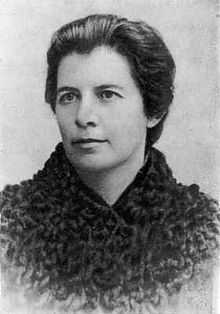Olena Pchilka
| Olha Petrivna Kosach Ольга Петрівна Косач | |
|---|---|
 | |
| Born |
June 29, 1849 Hadiach, Poltava Governorate, Russian Empire |
| Died |
October 4, 1930 (aged 81) Kiev, Soviet Union |
| Pen name | Olena Pchilka |
| Occupation | writer, civil activist |
| Language | Ukrainian |
| Ethnicity | Ukrainian |
| Citizenship |
Russian Empire Soviet Union |
| Alma mater | Exemplary Boarding School of Noble Maidens (Kiev) |
| Spouse(s) | Petro Antonovych Kosach |
| Children | Lesia Ukrainka |
Olha Petrivna Kosach (29 June 1849 – 4 October 1930), better known by her pen name Olena Pchilka, was a Ukrainian publisher, writer, ethnographer, interpreter, civil activist. Sister of Mykhailo Drahomanov. Mother of Lesya Ukrainka
Early years
She was born in Hadiach in family of a local landowner Petro Yakymovych Drahomanov. Her basic education Pchilka received at home and then later finished the Exemplary Boarding School of Noble Maidens (Kiev) in 1866. She was married to Petro Antonovych Kosach sometime in 1868 and soon moved to Zvyahel where he worked. Here was born one of her daughters Lesya Ukrainka. Pchilka is, perhaps, the most well-known Ukrainian female poet. She died in Kiev.
Pchilka recorded folk songs, folk customs and rites, and collected folk embroidery in Volhynia, later publishing her research.
She published numerous works, and was active in the feminist movement, particularly in cooperation with Natalia Kobrynska with whom she published an almanac in Lemberg "Pershyi Vinok".
National question
Both in her writing and in her personal life Pchilka was critical to some of Jews that were ignorant towards the Ukrainian culture and laughed at it. She was critical to those Jews in Ukraine that were unrestrained practicing what was later qualified for the price gauging. For such of her remarks she was shunned and laughed at even by her contemporaries, such as Chikalenko, Yefremov, Volodymyr Vynnychenko and other intellectuals.[1][2][3] She however was not only critical of Jewish people, but more of the Russian chauvinism, to which a great deal of people leaned.
Interpreter
Pchilka also was an interpreter and translated into the Ukrainian language many famous works, such as those of Nikolai Gogol, Adam Mickiewicz, Aleksandr Pushkin and others.
Works
Among the most prominent of her works are the following:
- "Tovaryshky" (Comradesses, 1887),
- "Svitlo dobra i lyubovi"(The light of goodness and love, 1888),
- "Soloviovyi spiv" (Nightingale singing, 1889),
- "Za pravdoyu" (For a truth, 1889),
- "Artyshok" (Artichoke, 1907),
- "Pivtora oseledsya" (One and a half herring, 1908),
- a play "Suzhena ne ohuzhena" (1881),
- a play "Svitova rich" (World thing, 1908) and others.
References
External links
- Works by or about Olena Pchilka in libraries (WorldCat catalog)
- Olena Pchilka at the Encyclopedia of Ukraine
|